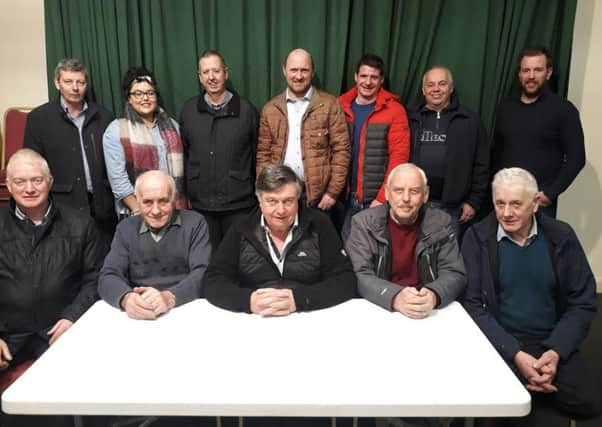Mid Tyrone Lamb Group holds AGM


There was a great turnout of members which made for a successful night.
Shaun McElhinney from Claremount Chartered Accountants was the first of the three guest speakers.
Advertisement
Advertisement
Shaun was invited to educate all members on the looming ‘Making Tax Digital’ (MTD) initiative set out by HMRC. The initial registration threshold is £85,000 of an annual turnover, (which is sales alone), commencing April 1, 2019. MTD is the government’s plan to modernise and digitalise the tax system, claiming to be more effective and efficient for tax payers which includes VAT and Self-Assessment. Businesses must maintain digital records and submit their VAT Returns to HMRC through online accounting software. From April, the current HMRC Online Gateway will no longer be in use if you are over the threshold. MTD will be rolled out to all businesses, under the initial £85,000, threshold by approximately April 2020. Anyone who has queries should contact their accountant for further training and advice.
The second guest speaker of the night was Keith Sheridan, a vet from the local Parkview Veterinary Clinic in Strabane. Keith was asked to speak about scab and lice in sheep as an increased concern facing farmers. Scab is one of the most contagious parasitic diseases of sheep in UK and is now considered an epidemic, resulting from, no doubt, an end to the compulsory dipping periods. Lice and Scab are very hard to differentiate without the use of a microscope therefore a clinical diagnosis is key to treat effectively. Scab is a form of allergic dermatitis caused by the mite and its faeces, producing crusty lesions which become apparent four or five weeks after infection. One mite is enough to infect a sheep, and it can lay one or two eggs daily in the fleece for around 40 days. They feed on the surface of the skin but can also survive away from the sheep and remain infective for up to 16 days. This is how sheep get infected apart from the most common sheep to sheep transmission but through transporters, fence posts where they rub, bushes, contaminated clothes and equipment. Scab seriously affects the welfare of sheep and has significant economic impact through its effect on the condition of the ewes, reduced quality of sheepskins and growth rate of lambs. There is no vaccine for scab, only treatments such as injectables and dipping with OP, however dip is the only treatment for lice. Scab in sheep is a notifiable disease and farmers have a legal obligation to report cases of scab. Prevention is crucial in protecting your flock when buying sheep, for that reason placing bought sheep in quarantine for two weeks is best practice and treat with injectables. If your neighbour is infected, do not place sheep in direct proximity, double wired boundaries help reduce spread and ensure your sheep are not breaking out into contaminated flocks, or contaminated sheep get into your flock.
The final speaker was David Wright who is the Northern Ireland editor of the Farmers Journal. David was asked to speak about ammonia/nitrates and Brexit on Northern Ireland farming. David started off by discussing the lack of government in the north affecting policies. One such issue is Bovine TB where we are without a decision on badger culls and rolling out cost of annual tests being directed at the farmer. The most important issue we are currently facing is the environmental impact from farming, especially here in Northern Ireland where we have one of the most intensive livestock sectors in EU. This is enhanced by the media, vegan lobbying, and throw away comments from the Irish Taoiseach regarding limiting meat intake. The nitrate action programme targets to reduce the impact on the environment, however the latest programme ended last year, but without a government, we are in limbo. The action programme covers Phosphorus (P), which is our issue in Northern Ireland as 2/3 of our lakes are classed as not good for P. The increasing intensive livestock production results in increased feed required for the livestock and increased slurry and this risks being leached into the waterways. P containing fertilisers will be restricted in the next programme, with soil analysis of less than two already required for spreading. NIEA are invested in protecting the bogs, sensitive areas and special habitats by such ways as blocking plans in tier 2 of the investment programme. They are concerned with the ammonia load which is double in Northern Ireland compared with the Republic of Ireland. The new action programme will involve bans on splash plate slurry spreading by 2025 or earlier, no digestate spreading with the splash plate, and introduction of trailing shoe and dribble bar requirements. The new rules will have implications for everyone with the need for extra finance for machinery and appliances, weight on the land will increase as will the need for contractors if you want to avoid the expense of new equipment. Slurry stores will also need to be covered in the near future to reduce ammonia loss, straight urea fertilisers will be less available and focus on keeping urea and urine separate with a clean yard for example will be within the new programme. Brexit was also a hot topic which carries such uncertainty. One of the main issues we face in the farming sector is trade barriers and tariffs. The introduction of tariff barriers means that farming may be less economically viable adding £35/head onto sheep, imports will cost more, and this will inevitably put up the cost of food. The risk of no tariffs however exposes us to cheaper food, undermining our own market. The reality is that Brexit gives no certainty but to believe that there is always opportunity in adversity.
The group would like to thank all the sponsors of the night who gave generously: L W Surphlis, Killygordon Animal Health, Parkview Veterinary Clinic, Sean McBride, Strule Vets, Fane Valley, P McSorley, Gibson’s Agri, Clonleigh Co-op, Holden Agriculture and Shearwell Data.